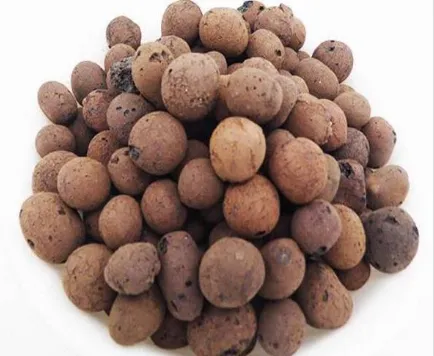In the realm of gardening and horticulture, the health of the soil is paramount for plant growth. Clay pebbles have emerged as a crucial ally in maintaining optimal soil conditions, particularly when it comes to soil aeration. Alongside specialized variants like expanded clay pebbles and hydroton clay pebbles, they play a multifaceted role in enhancing the porosity and oxygen availability within the soil.

Understanding the Basics of Clay Pebbles
Clay pebbles are small, round aggregates made from natural clay materials. Their unique structure and properties make them ideal for improving soil aeration. When incorporated into the soil, clay pebbles create air pockets, allowing oxygen to penetrate deeper into the root zone. This increased oxygenation is essential for root respiration, enabling plants to absorb nutrients more efficiently. Additionally, clay pebbles help to prevent soil compaction, which can suffocate plant roots and hinder growth. By providing a stable, lightweight structure, they support the overall health of the soil, making it a more hospitable environment for plants.
The Superiority of Expanded Clay Pebbles
Expanded clay pebbles take the benefits of clay pebbles to the next level. These pebbles are created by heating natural clay to high temperatures, causing it to expand and form a lightweight, porous material. The resulting structure of expanded clay pebbles is highly effective in soil aeration. Their numerous tiny pores not only increase oxygen flow but also improve water retention and drainage. In soil, expanded clay pebbles act as a buffer, ensuring that the soil remains moist without becoming waterlogged. This balance is crucial for preventing root rot and promoting healthy root development. Their durability also means they can be reused in multiple gardening projects, making them a cost - effective and sustainable choice for soil aeration.
Hydroton Clay Pebbles: A Specialized Solution
Hydroton clay pebbles, a popular brand of expanded clay pebbles, offer specific advantages for soil aeration. Known for their consistent size and quality, hydroton clay pebbles are designed to provide uniform aeration throughout the soil. Their smooth surface reduces the risk of root damage during installation and growth. In hydroponic systems and container gardening, hydroton clay pebbles are often the preferred choice. They create a stable growing medium that allows roots to spread easily while maintaining excellent aeration. The pebbles' ability to support plant stability also makes them suitable for larger plants with extensive root systems, ensuring that the soil remains well - aerated even under the weight of the plants.
Best Practices for Using Clay Pebbles
To maximize the benefits of clay pebbles, expanded clay pebbles, and hydroton clay pebbles in soil aeration, proper usage is key. When adding them to the soil, it's important to mix them thoroughly to ensure even distribution. In container gardening, a layer of pebbles at the bottom of the pot can improve drainage and aeration. For larger garden beds, incorporating the pebbles into the topsoil or creating raised beds with a pebble - enriched soil mixture can significantly enhance soil health. Regularly monitoring the soil moisture and adjusting the amount of pebbles as needed will help maintain optimal aeration and plant growth conditions.
The Role of Clay Pebbles in Soil Aeration FAQS
How do clay pebbles improve soil aeration?
Clay pebbles improve soil aeration by creating spaces within the soil matrix. When mixed into the soil, they prevent soil particles from compacting together, allowing air to flow freely. These air pockets ensure that oxygen reaches the plant roots, which is essential for root metabolism and nutrient uptake.
Can expanded clay pebbles be used in all types of soil?
Yes, expanded clay pebbles can be used in various types of soil. Whether it's sandy, clayey, or loamy soil, they help to improve aeration and drainage. In sandy soil, they retain moisture, while in clay soil, they break up the heavy texture and increase porosity.
What makes hydroton clay pebbles different from other clay pebbles?
Hydroton clay pebbles stand out due to their consistent size, smooth surface, and high quality. This consistency ensures uniform aeration and root support. Their smoothness reduces root damage, and their quality makes them reliable for both hydroponic and traditional soil - based gardening.
How often should I add clay pebbles to my soil?
The frequency of adding clay pebbles depends on the condition of your soil and the growth of your plants. In general, incorporating them during initial soil preparation or when repotting plants is sufficient. However, if you notice signs of poor aeration, such as waterlogging or stunted growth, adding more pebbles can help address the issue.
Are clay pebbles environmentally friendly?
Yes, clay pebbles are environmentally friendly. They are made from natural clay materials, and their production process, especially for expanded clay pebbles and hydroton clay pebbles, has a relatively low environmental impact. They are also reusable, reducing waste and promoting sustainable gardening practices.
Are you looking to enhance the health of your soil and the growth of your plants? Our company offers high - quality clay pebbles, expanded clay pebbles, and hydroton clay pebbles. Sourced from the best materials and manufactured with precision, our products are designed to optimize soil aeration and create the perfect growing environment for your plants. Whether you're a professional gardener or a passionate hobbyist, our clay pebbles can transform your gardening experience. Contact us today to place your order .
-
The Versatile World of Phlogopite Mica: Properties, Forms, and ApplicationsニュースJul.14,2025
-
The Versatile Applications of Calcined Mica: From Decoration to Industrial UseニュースJul.14,2025
-
The Role of Muscovite Mica in Industrial Insulation MaterialsニュースJul.14,2025
-
The Benefits of Using Expanded Clay Pebbles in Hydroponics and Soil GardeningニュースJul.14,2025
-
Innovative Applications of Mica Flake in Paints and CoatingsニュースJul.14,2025
-
Gardening Expanded Clay Usage: A Complete GuideニュースJul.14,2025
-
The Use of Natural Mica Powder in Skincare ProductsニュースJun.11,2025








